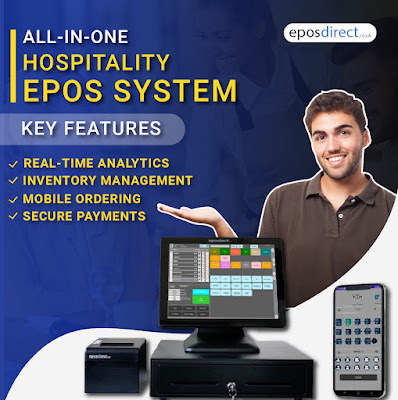In a fast-paced and fast-growing restaurant industry, it is to find an epos system that can keep up. Modern epos software has evolved into a tool that streamlines every aspect of the restaurant business, from customer experience to management responsibilities.
As you
move through the process of evaluating epos software for takeaway or your restaurant, there are a few significant factors
to consider as you compare. Think about how new systems will affect your
customers, staff, and profits. Test or demo every solution that shortlists and
look for the features that matter most to your team.
Pay your attention to the following seven areas:
1. Customer Experience
At the end
of the day, you should keep your customers satisfied. Having a
restaurant epos system in the UK that improves customer
experience is essential. Customers appreciate being able to seamlessly split
checks, move bar tab, switch tables - and a special reward, having the option
to make a payment right from their seat through the waiter's Pad.
2.
User Experience
Your staff
use advanced software in their personal lives. Coming into your restaurant and
using poorly designed software can quickly turn into a major reason for
dissatisfaction. Epos system that is intuitive, easy to use and navigate, makes
for a better user experience. They'll also have the option to clock in right
inside the system, making it easy to come into work and set it up and
simultaneously improve payroll automation and accuracy.
3.
Data Access and Control
You can't
be at the restaurant all day, but with an older desktop-based system, you could
feel like you must be. That is a particularly annoying issue when you have to
make a small schedule or menu update. Instead, choose epos software that can
provide you to access your data from any place, on any device. Whether it is a
menu update, a schedule conflict, or a payroll issue, choose an epos
system in London that will allow you to manage everything in
real-time, any place you are.
4. Security
When
security and maintenance are included in your agreement with the software
vendor, expensive IT support and manual updates are nonexistent. Modern POS
software will include automatic data backups, custom access controls, and data
encryption to safeguard against staff negligence and criminal information
theft. You will find peace of mind knowing your customer's credit card numbers
are protected and that your PCI compliance responsibilities can also be
reduced.
5.
Reporting
Restaurants
have a lot of data about transactions and customers. If you want to have the
total value of this data, you require a solution with intelligent reporting.
Look for epos software that allows you to produce real-time reports and drill
down into whichever metrics make a difference to your business. You will have
the option to see which products sell best at what times and days and what
segments are the most productive. You will also have better insight into your
staff performance, your actual labour costs, food costs, and the flow of new
customers.
6.
Inventory
It is no
surprise - restaurants need to work with thin margins. Look for an epos system
that simplifies your inventory management. You should have the option to follow
your ingredients and products and keep an eye on where every last bit of it
goes without any problem. Not only do you have better insight into what is
going on with your inventory, but you can also better communicate when it is
the right time to place an order or if it is the time to cut back on reordering
specific products.
7.
Speed
At the end
of the day, irrespective of what kind of restaurant you are operating, speed of
service is of utmost importance. You have a lot of time to boost your
opportunity to earn revenue. That means moving through each step of the dining
process quickly while offering a seamless experience for customers, wait staff,
bar staff, chefs and supervisors. The last thing you need is an epos system
slowing that process down.
While
choosing a restaurant epos system or a pub epos system,
keep these seven points in mind during your assessment process.

